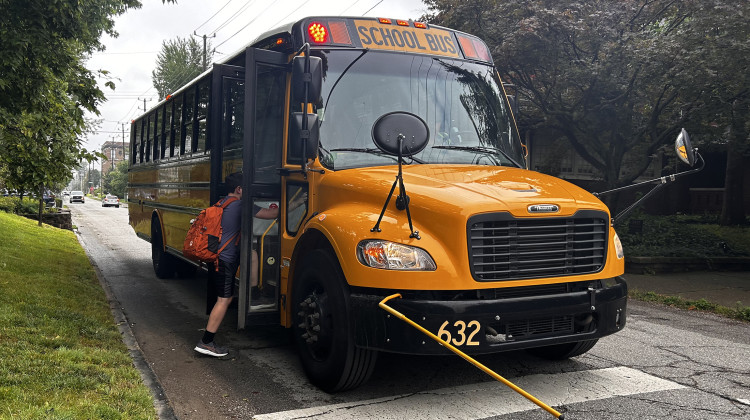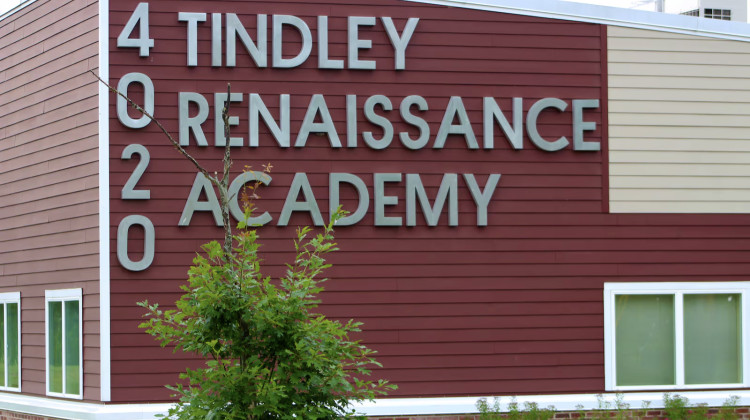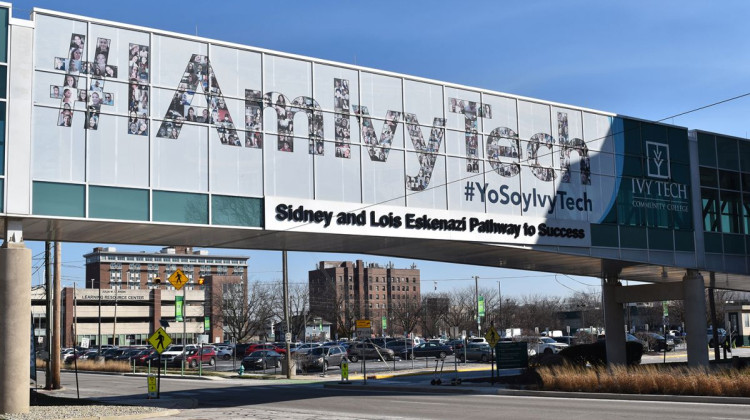Kids are returning to school this month, and according to the National Summer Learning Association, about nine out of 10 teachers will spend as much as three weeks on review because of summer learning loss. That’s something school districts and libraries continually try to fight with academic programs.
Maggie Pinnick is one of the teen service librarians at the Frankfort Community Public Library. During the lock-in last Friday – an end-of-the-summer party for those who did enough book reports while school was out – she created an obstacle course, based on the Divergent series of young adult books, set up between bookshelves.
And ninth grader Hailey Cook, seventh grader Emily Shepherd and fourth grader Jovana Andrade took a break from a Hunger Games Nerf gun war to talk about their favorites: The Selection, Wonder, and Pandas Don’t Eat Bamboo, respectively.
Frankfort’s median household income is about a quarter lower than the state’s. It’s also an uncommonly diverse small city in the state, with more than a quarter of its residents reporting Latino heritage. Both of those factors make the city susceptible to a widening achievement gap.
In addition, the school corporation serving the town – Community Schools of Frankfort – has received mostly a D grade from the Indiana Department of Education since 2005 and has never been rated higher than a C in that time.
National Summer Learning Association Vice President of Program and Systems Quality, Monica Logan says when students aren’t engaged over the summer, they’ll come back a few months behind their peers.
“So by the time kids are preparing for high school, they are at greater risk of dropping out because they don’t have access to those really important, critical experiences in the summertime,” Logan says.
According to the NSLA, most students lose an average of two months of math skills, and low-income children lose up to three months in reading, every summer.
Logan says the best summer reading program can mix academics and enrichment together seamlessly. For example, combining math problems with playing an instrument.
Logan says the kids in Maggie Pinnick’s Frankfort program – mostly sixth to ninth graders – are about the oldest she usually sees in summer reading programs. She says high schoolers can find meaningful engagement in summer internships, so involvement in summer reading programs isn’t as necessary.
Indiana Department of Education secondary literacy specialist Melanie Martz says meeting students’ interests drives participation.
“And I think there’s also the opportunity that some local districts will do specialty camps, like a STEM camp or a fine arts camp,” Martz says. “That’s really trying to engage students in a certain topic they’re interested in.”
For the less-formalized library programs like Frankfort’s, that could mean allowing creative freedom in the weekly classes – something Maggie Pinnick tries to do.
In a stop-motion story activity, meant to engage technology and reading to create a story, she had one rule: books had to be involved. Instead of incentives like grades, kids in the program are rewarded with free books.
Secondary literacy specialist Jordan Pridemore says it’s a teacher’s job to help students want to learn, so they’ll push themselves.
“I think that that’s kind of the hope and dream of all teachers, is that they can instill that in their students,” Pridemore says. “Not necessarily that ‘I have to do this, so that I do better on the test’ or ‘I have to do this so school isn’t as hard’, but ‘I’m going to read this book because I love it – and I love learning.’”
Teachers -- the IDOE and NSLA agree -- are the last major key to a successful academic program. And for kids like seventh grader Madyson Cook, who says she doesn’t even like reading all that much, they’re why she wants to come back to the program.
“’Cause of Maggie and everybody else who works here," Cook says. "Because everybody’s so nice and you get to have fun."
 DONATE
DONATE










 Support WFYI. We can't do it without you.
Support WFYI. We can't do it without you.